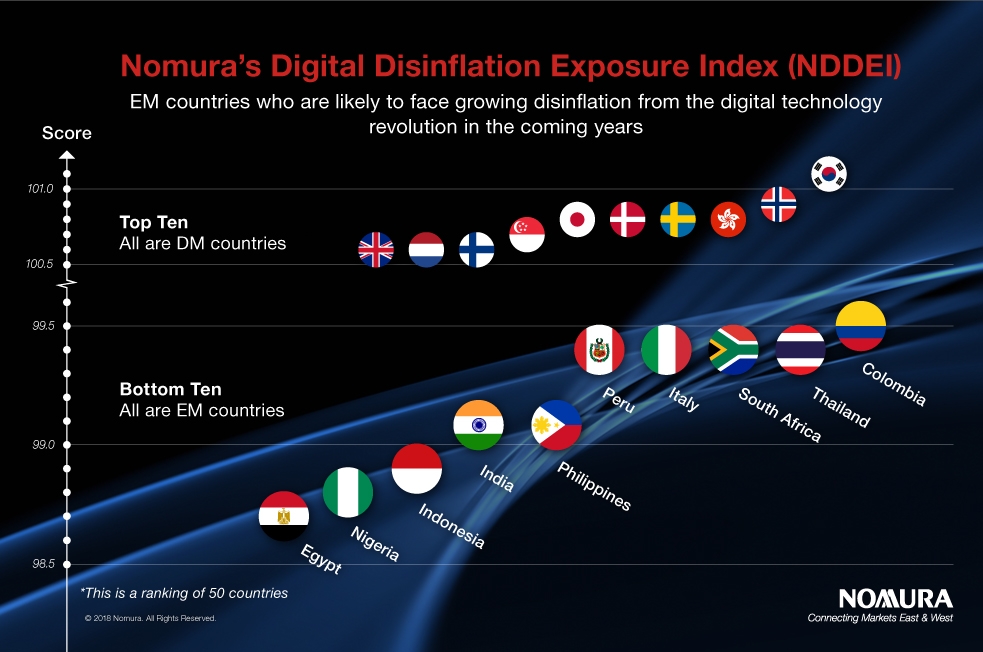Technology | 2 min read June 2018

Emerging Markets | 2 min read | June 2018

Emerging Markets | 2 min read | June 2018
Bigger force for EM
In EM economies, this digital wave is just getting started. However, in the years ahead, we expect it to penetrate EMs at a faster rate than it did in DMs, and it will turn out to be a more powerful disinflationary force than that currently experienced by the latter. It is also possible that in the coming years, some of the largest and historically more high-inflation prone EM economies could experience further deflation, but of the good type, driven by the digital wave rather than weak demand.
The first wave of global disinflation came from the globalization of trade. South Korea, a large emerging market, has the highest NDDEI score and therefore, currently faces the greatest digital disinflationary force, closely followed by Norway, Hong Kong, Sweden and Denmark.

What is digital disinflation?
The world is now experiencing a second wave of global disinflation, driven by the digital technology revolution, or the Fourth Industrial Revolution. (Read our previous article for further insights.)
Companies can now quickly achieve economies of scale by accessing a global market that was unavailable before, and can save costs by automating production processes, arbitraging labor by outsourcing services; real-time inventory management and cutting out the middle man by selling directly to the customer. With information directly at their fingertips, consumers are provided with an abundance of choice, pricing knowledge and the convenience of shopping.
While online sales were traditionally high in categories such as video, music, gaming and software, it has quickly spread to almost all goods and services, in some cases, providing immediate if not, same-day delivery. A key distinguishing factor of the digital wave is customer experience.
Economic theory tells us that this digital wave should be disinflationary in a number of ways:
1. E-commerce is a lower-cost business model and cost savings can be passed directly on to customers
2. Information explosion has increased pricing power of consumers over producers
3. Low-cost technology results in higher efficiency and lower wage bargaining power of workers
4. There are great challenges on how to properly measure consumer price inflation
Read our report here for the full ranking of the Digital Disinflation Exposure Index.

Head of Global Macro Research

Macroeconomic Research Analyst, Asia ex-Japan
This content has been prepared by Nomura solely for information purposes, and is not an offer to buy or sell or provide (as the case may be) or a solicitation of an offer to buy or sell or enter into any agreement with respect to any security, product, service (including but not limited to investment advisory services) or investment. The opinions expressed in the content do not constitute investment advice and independent advice should be sought where appropriate.The content contains general information only and does not take into account the individual objectives, financial situation or needs of a person. All information, opinions and estimates expressed in the content are current as of the date of publication, are subject to change without notice, and may become outdated over time. To the extent that any materials or investment services on or referred to in the content are construed to be regulated activities under the local laws of any jurisdiction and are made available to persons resident in such jurisdiction, they shall only be made available through appropriately licenced Nomura entities in that jurisdiction or otherwise through Nomura entities that are exempt from applicable licensing and regulatory requirements in that jurisdiction. For more information please go to https://www.nomuraholdings.com/policy/terms.html.
Technology | 2 min read June 2018
Economics | 1 min video April 2018
Technology | 4 min read May 2017